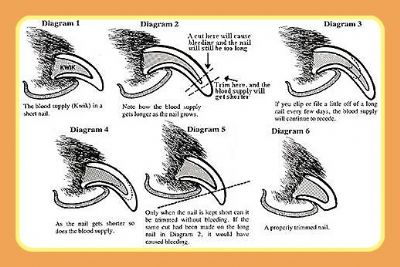RHEGED | General Springer health care
Sub-links for this page

Portrait of Welsh & English Springer Spaniels - by A. Wardle
- Keep to a regular worming & vaccination programme with your Springer (according to current protocols) ~ especially if intending to use Boarding Kennels, travel abroad, etc ~ & as advised by your Veterinary Surgeon.
- Keep teeth clean by regular brushing with a proprietary toothbrush & toothpaste, & ensure that your Springer can massage its gums & clean its own teeth by providing chews specially made for this purpose (available from all pet shops/dog shows/veterinary surgeries, etc).
- Keep ears free from excess debris by maintaining regular checks & gently cleaning out with the use of proprietary (ones especially for 'drop-eared' dogs) ear cleansers. Make sure that the hair underneath the earflap is kept short/clipped/trimmed to enable as much air as possible to circulate around the opening of the ear canal.
- Keep to a routine for brushing & combing, so that you can make certain that the skin & coat are kept in a good, healthy condition. As your Spaniel will need some trimming, you should find out the best place to go to keep your Springer's coat free from knots & excess feathering (especially around the feet, ears, & neck, underneath legs & rear end). The breeder of your Springer should be happy to advise or show you how to do this.
For more information visit our RHEGED Springer Spaniel Grooming page.
- Keep to a fixed dietary programme best suited to your Springer's needs (e.g. Complete, tinned, natural feeding, dry food/kibble), making sure that your Spaniel has access to clean, fresh water at all times.
- Keep to a regular exercise & activity programme, attributable to the age of your Springer & for maintenance of both correct body mass/weight & mental stimulation (working &/or play).
- Keep an eye open for any signs of problems (e.g excess urination or blood in stools or urine, loss of appetite, excessive drinking, severe coughing, breathing difficulties, vomiting, diarrhea, changes in behaviour or temperament or any signs of lameness). If you are able to give accurate descriptions of any problems, this will assist your Vet to give a more accurate diagnosis.
ALL DOGS (MALE & FEMALE) - CHECKLIST
- EYES: Check for any excessive discharge or pus in the conjunctiva (corner of the eye), the cornea (centre of the eye) to make sure there is no cloudiness. An annual eye examination by a Vet or Ophthalmologist would be helpful.
- EARS: Check for discharge, odour from ear canal; examine ear flaps for wounds or swelling.
- FEET: Examine for wounds, cracks, cysts between the toes & nail bed infection. Trim the nails often.

MOUTH, TEETH & GUMS:
Check for any signs of dental decay, accumulation of tartar & inflammation & colour of gums. Be aware of the smell of your dog's breath as any changes (acidic) might indicate an underlying physical problem. Any long term neglect of teeth can sometimes prove to be the cause of other conditions which might have an adverse effect on your dog's health and well being.
BODY, COAT & SKIN:
Watch the weight of your dog by balancing the amount of food eaten to the amount of exercise taken.
*** Note
Look for areas of thickened skin &/or baldness, particularly on elbows & hocks. Check for evidence of excessive scratching, cuts, bites. Test skin's mobility, worm segments under the anus, warts, hard or soft lumps. Check anatomical parts of both dog & bitch on a regular basis (penis, testicles, vulva & mammary glands) for any evidence of swelling, lumps or infection.
FAECES (MOTIONS) & URINE:
Note consistency, colour, changes in frequency. Look for undigested food, blood.
TEMPERAMENT & GENERAL ATTITUDE CHANGES:
Watch for behavioural changes or evidence of abnormal behaviour - depression, anxiety, aggression or excessive timidity, severe loss of appetite, excessive thirst and excessive urination.
*** Note
Castrated males & spayed females do not automatically become overweight once neutered. Hormones do play a part in the way that a dogs metabolism works. It is true to say that changes to the coat texture can take place, but careful coat care & trimming should help.
MALE SPRINGERS:
There is scientific evidence to say that the age of the un-castrated male dog can raise the risk of the development of prostate cancer. (The younger the dog is when castrated, the less likelihood of development of prostate cancer).
FEMALE SPRINGERS:
Hormone levels in the female can have a great influence not only on your bitch's behaviour but also on the way her body works. Unspayed bitches can be prone to false or phantom pregnancies when their bodies convince their brains that motherhood is impending. There is some evidence to say that the bitch can be more susceptible at such times to a predisposition to immune-related conditions (anaemia, hypothyroidism, etc), & the chances of her developing mammary tumours are greater the older she continues to come into season (oestrus).
VULVA:
Check for signs of excessive licking or discharge, paying particular attention to the 3 month period following the bitch's last season, whether or not she has been mated. If any doubt, & particularly should your bitch be showing any other abnormal changes both physically &/or emotionally, please take her to your Vet. Bitches can suffer from both open & closed 'Pyometra' (uterine infection) & in the case of the latter danger signs can be overlooked, possibly putting your bitch's life at risk.
MAMMARY GLANDS: **
Check for changes in shape, swelling, soreness, lumps both in glands & teats.
** There is a current research project being carried out by the Animal Health Trust into Mammary Tumours in the English Springer Spaniel.
For more information follow this link - ESS Health Mammary Tumours
NB: There is scientific evidence to say that the age of the unspayed female can raise the risk of development of mammary tumours (the younger the bitch is when spayed, the less likelihood of development of mammary tumours).
